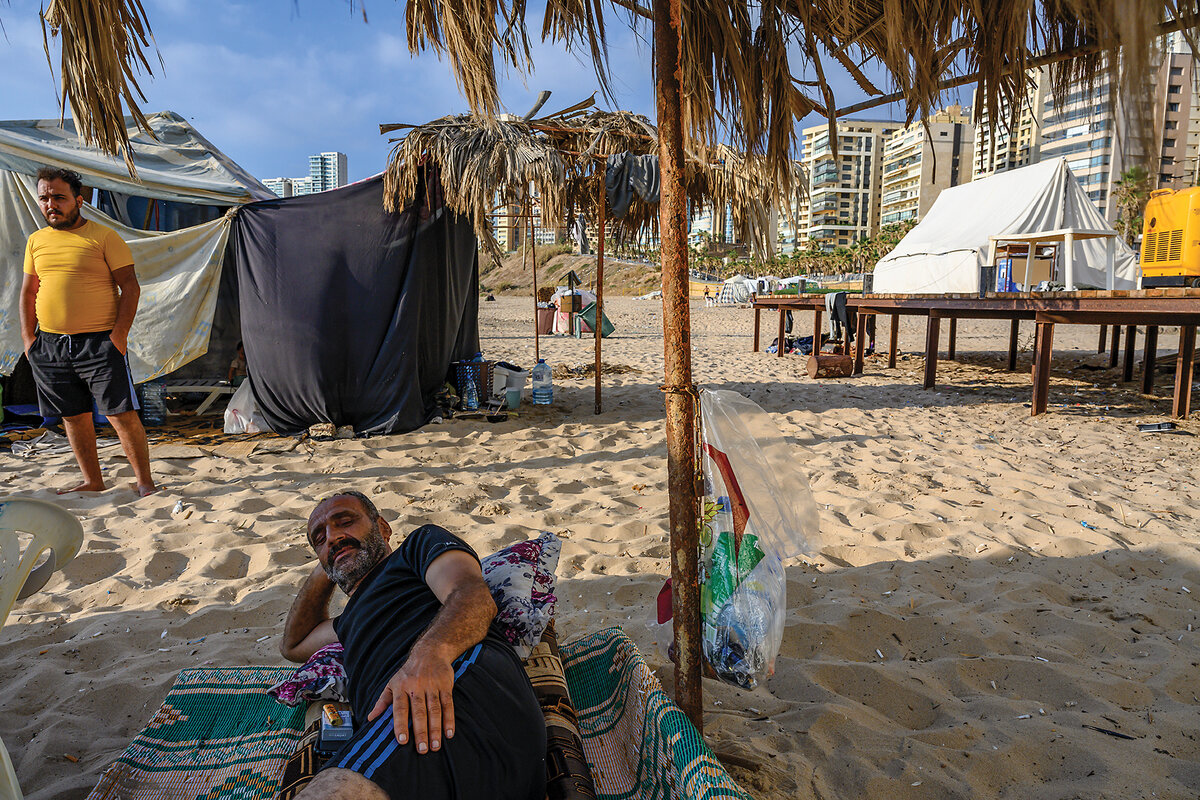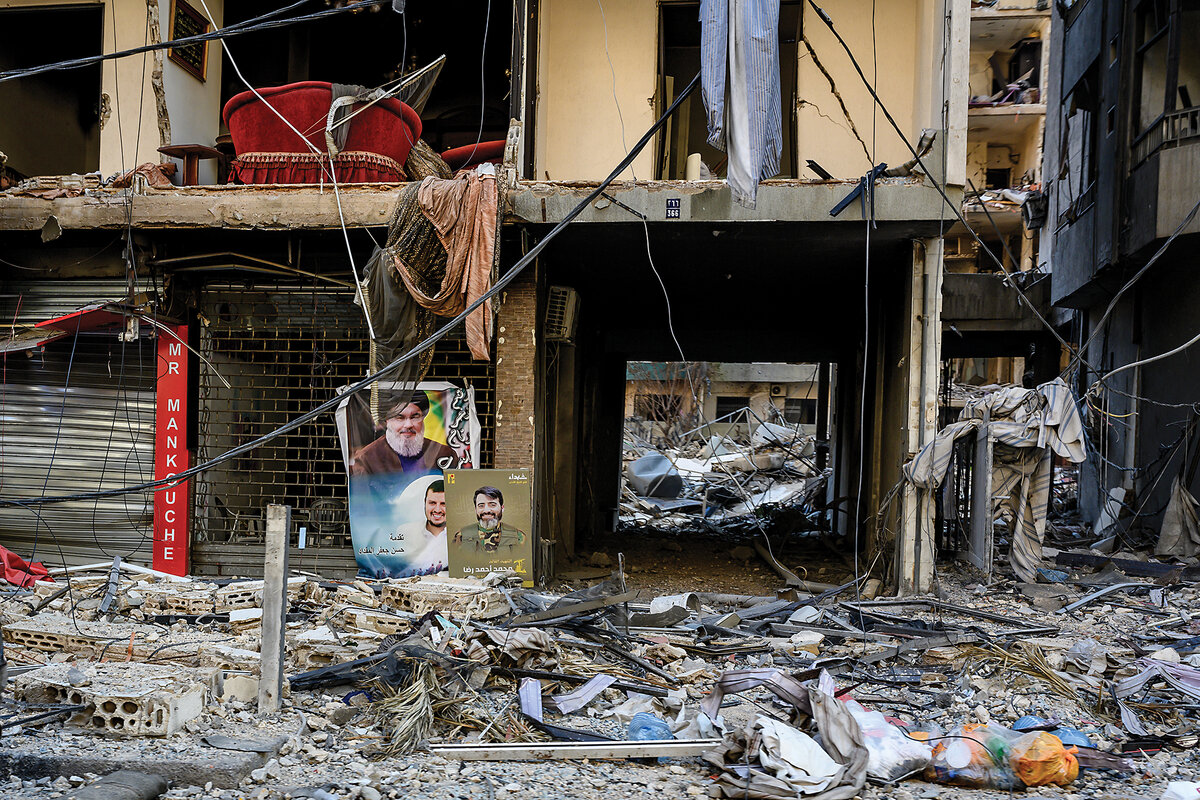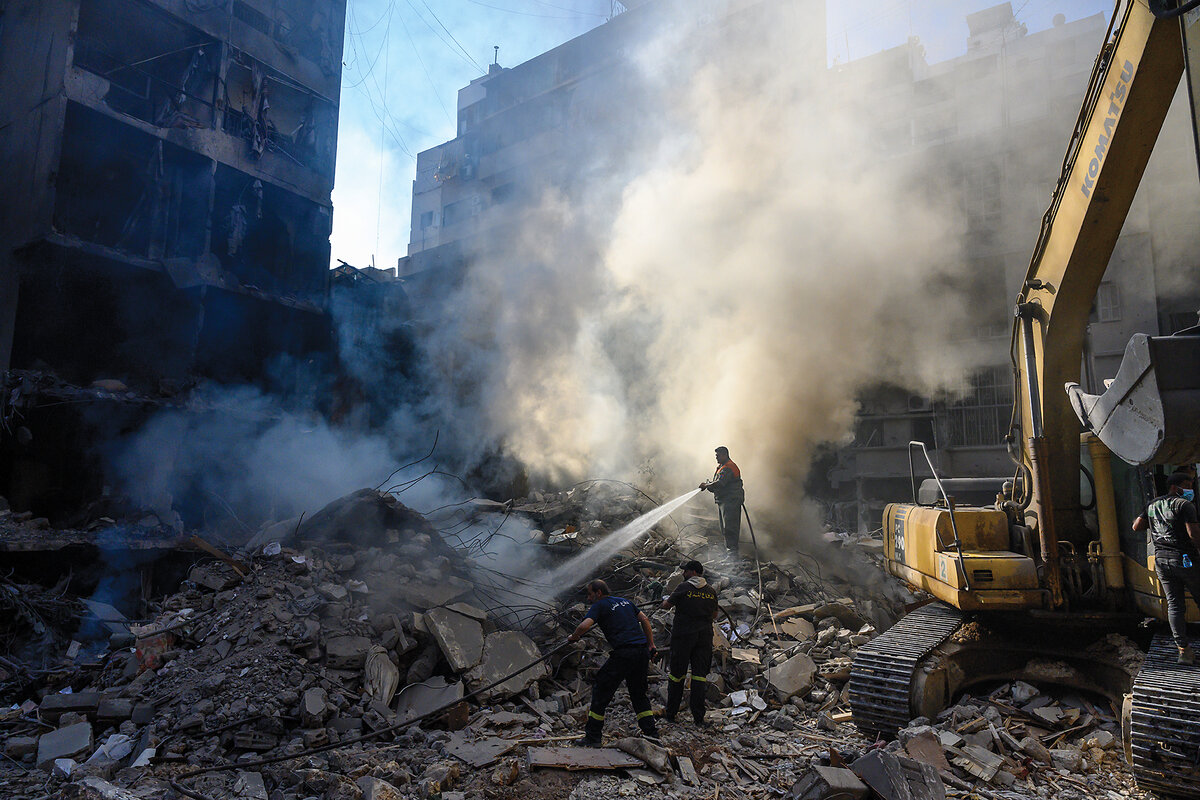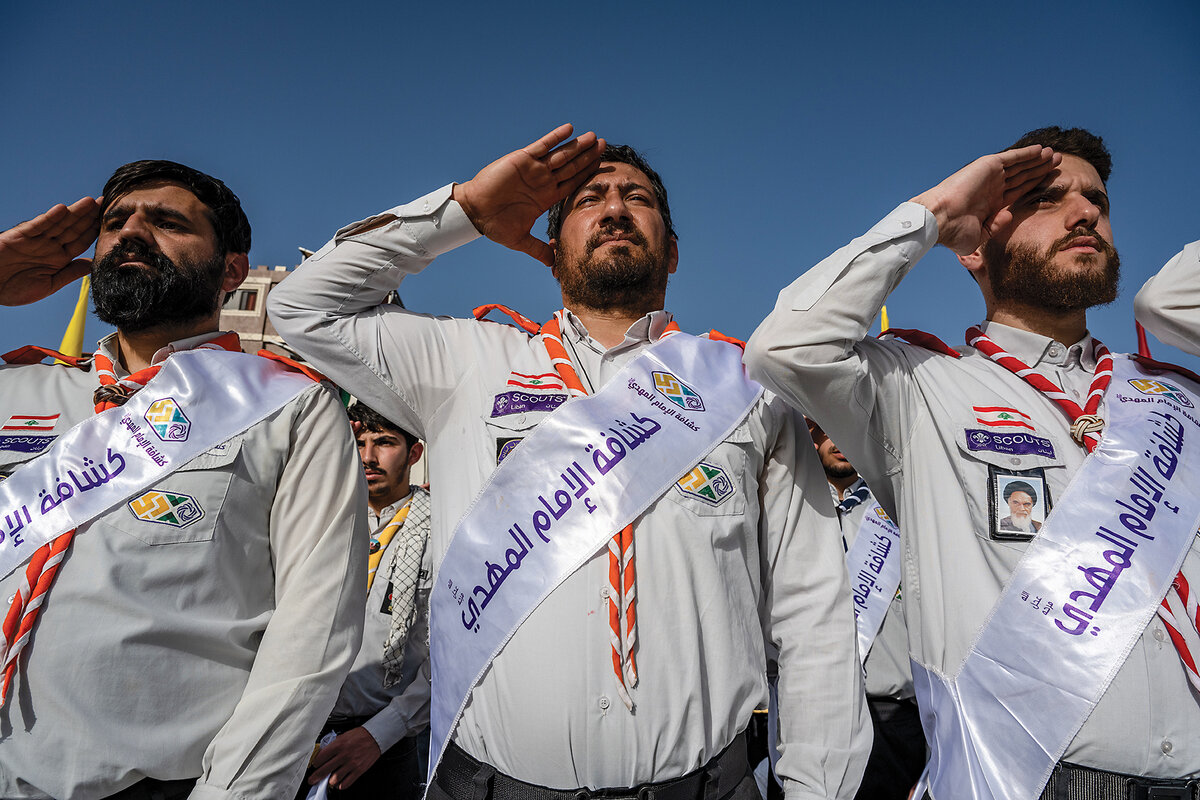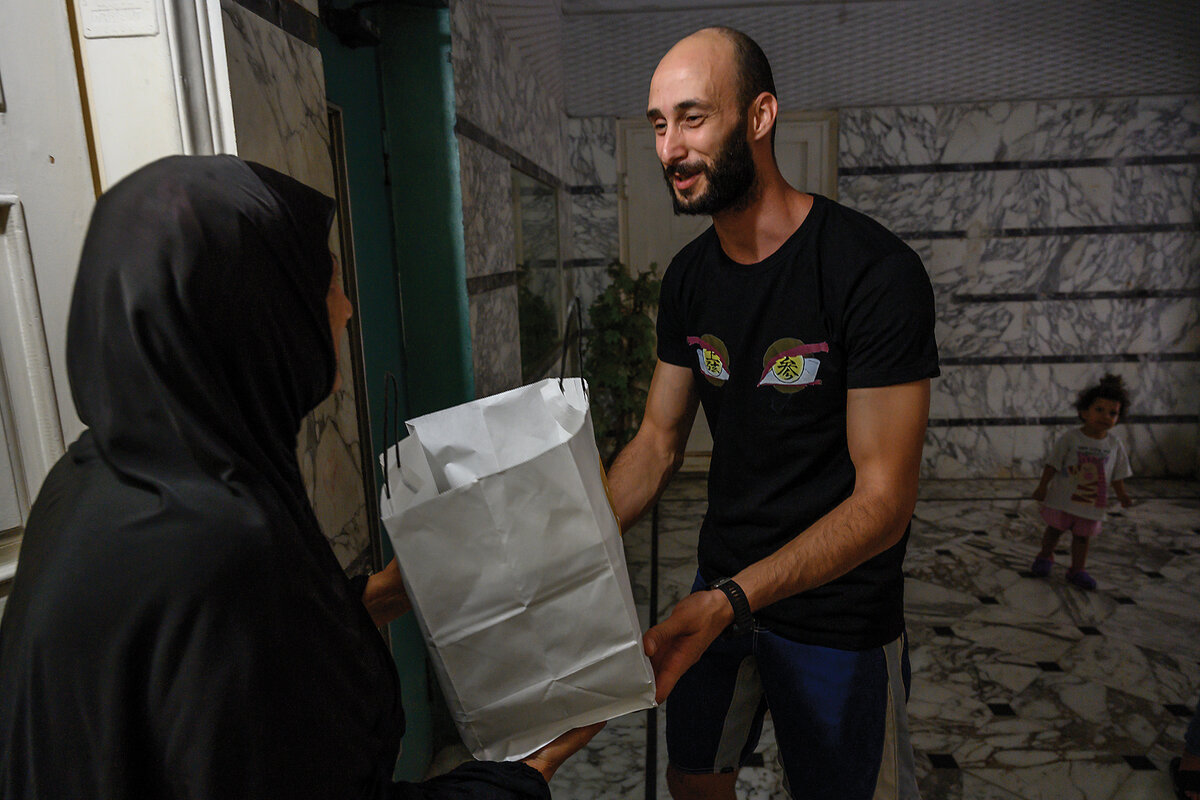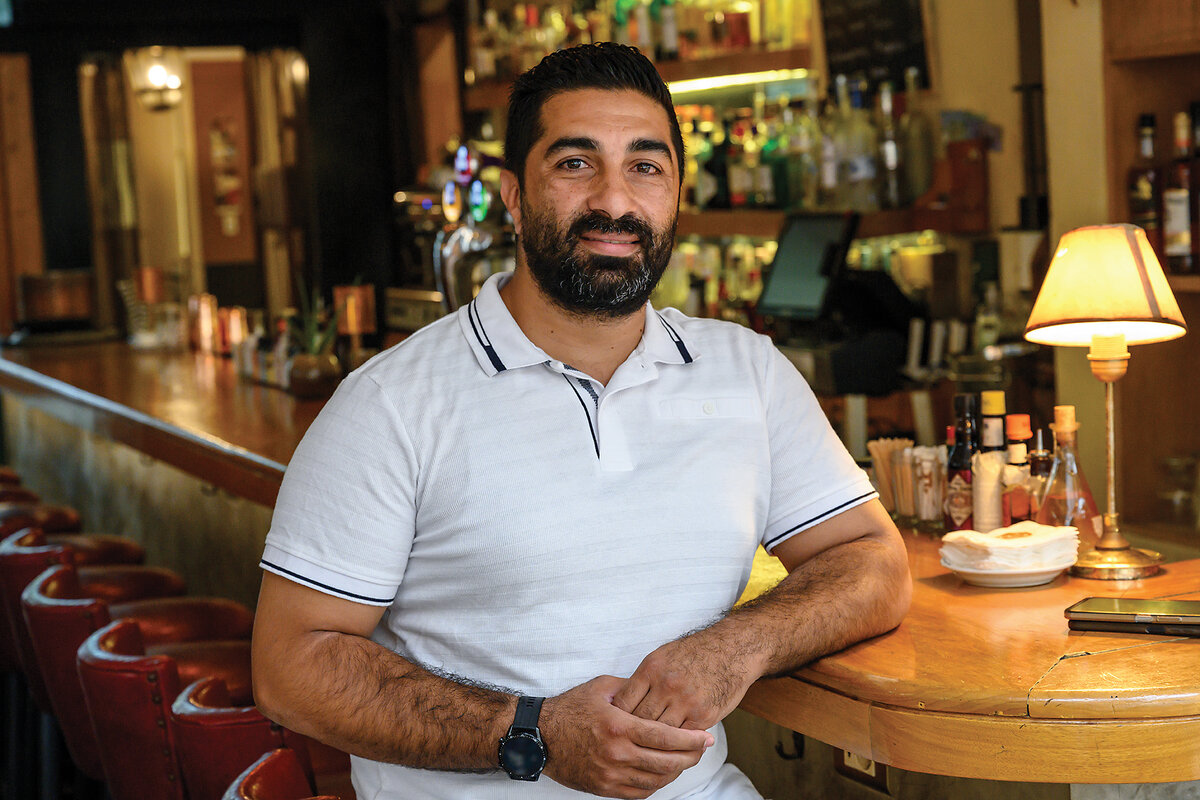‘We are looking for a good future’: Lebanese life amid the rubble
Loading...
| Beirut
The makeshift tent on this Beirut beach could not be more meager.
It was once a canvas-topped frame used to protect swimmers from the sun. It became a breeze-blown temporary refuge for a Lebanese man named Ahmed and his brother, both in their 60s, displaced by Israel’s airstrikes.
Unfinished trays of donated rice sit on the sand beside camp chairs. Bedsheets lie crumpled on cots. A wet swimsuit dries with a methodical drip, drip, drip near packages of bottled water stacked in reserve.
Why We Wrote This
Israel has decimated Hezbollah’s leadership and curbed its ability to fight. After ceasefire, supporters and opponents wonder what comes next.
The Shiite Muslim men live in the nearby southern suburb of Dahiya – a stronghold of Hezbollah, the Iran-backed Shiite militia, and where nearly a million people live. The sprawling community was pummeled almost daily by Israeli warplanes, with a final surge just before a 60-day truce starting Nov. 27.
Relegated by Israel’s bombs to this flimsy tent, the brothers said the previous few months have been surreal. Such a situation would have been unimaginable last summer.
They well know the destruction that has been meted out on Hezbollah. In a mass-scale attack on the Shiite militia’s leadership in mid-September, a sophisticated Israeli operation caused thousands of pagers and walkie-talkies to explode, killing more than 30 Hezbollah operatives and wounding nearly 3,000 others.
On Sept. 23, however, the brothers were forced to flee their home after Israel dropped 83 tons of explosives just two blocks from their apartment, an attack that killed Hezbollah’s lionized longtime leader, Hassan Nasrallah, in his underground bunker. On Oct. 1, Israeli forces also mounted a ground incursion, finding and destroying complex networks of Hezbollah tunnels as they battled Hezbollah fighters.
“We didn’t expect that Hezbollah would collapse this quick,” says Ahmed, a grizzled veteran Shiite fighter of decades past. Yet he remains defiant: “Resistance can’t be collapsed; Hezbollah can,” he says. “The struggle will remain.”
The brothers practice a deeply ingrained religious optimism, honed by decades of Shiite doctrine about righteous battle against the injustice of a stronger enemy.
“It is not necessary that Hezbollah is the side that will bring victory,” continues Ahmed. “This is a struggle of thousands of years. It isn’t just the struggle of Hezbollah or Fatah or Hamas,” he says, mentioning Palestinian factions. “They may go away or be destroyed, but others will come.”
Just down the beach from Ahmed and his brother, Layal Shahrour remains among Hezbollah’s staunchest supporters and is unwilling to write it off just yet. No amount of personal suffering detracts from Hezbollah’s destiny of victory, she says, despite sleeping pre-ceasefire on a thin mattress beneath a wood platform raised just 3 feet above the sand.
“Myself, I love Hezbollah more than before,” says Ms. Shahrour, who’s wearing a black abaya. She says her father was once taken captive by Israel, her brother killed in skirmishes before the war.
“They lost their hands and eyes for us to live in dignity,” she says, referring to Israel’s exploding pagers and walkie-talkies. “They are fighting for us to stand in our house with dignity. Hezbollah will win, even if you see difficulties.”
Ms. Shahrour can’t believe Israel really killed Hezbollah’s revered leader Mr. Nasrallah. “He’s not dead,” she says. “Even if he’s dead, he’s alive in our hearts.”
She longed for home, to Dahiya when the war was over, she says: “We are looking for a good future.”
In his makeshift tent, Ahmed expressed a similar sentiment – even if that future at home is altered by the defeat of Hezbollah. “Maybe some change won’t be bad – life must go on,” he says.
Just a day earlier, he had returned to his apartment to check the damage and collect some clothes. It was still intact, but its windows were smashed and its doors were blown open. Inside, everything was covered in fine powdery dust.
The smell of smoke was everywhere, with an abnormal chemical tinge. He could stay no more than 15 minutes. “I saw many wars. I know the smell of [gun]powder; I know the smell of fires,” says Ahmed. “This one was not like any of those.”
Not far away, displaced children played on the beach on climbing bars, singing as they swung. For a moment, the battering of Hezbollah and questions about its postwar future could not be further away, as the sun begins to set and the warm breeze blows.
But Ahmed is thinking of battles to come. “Israel, she will fight this generation, next generation,” he says. “And one day, she will not have the American support – she will not hold as now.
“She is struggling for 70 years, and 100 more years will fight wars, and wars, and wars,” he says. “It will never be their land. As Muslims, we cannot believe we are not going to win – not today, but tomorrow,” Ahmed says. “It’s coming.”
How Hezbollah fits into Iran’s “Axis of Resistance”
For decades, Hezbollah cast itself as the most powerful arm of Iran’s network of regional militias, dubbed the “Axis of Resistance.”
Iran built and supported this array of armed allies – which also includes Hamas in Gaza, various Shiite militias in Iraq, and the Houthis in Yemen – to fight Israeli and American influence across the Middle East. Most critically, these allies were to serve as Iran’s first line of defense against a direct attack.
As Iran built up other elements of its Axis, Hezbollah was part of a “unity of arenas” strategy, such that Iran’s proxies would be “effectively surrounding Israel with a ring of fire” if any individual member were attacked, says Michael Young of the Carnegie Middle East Center in Beirut.
The result? “With supreme arrogance and recklessness, Hezbollah carried Lebanon into a conflict which it knew the country, still reeling from the economic collapse of 2019-2020, could not sustain,” writes Mr. Young in an analysis for Carnegie’s “Diwan” blog.
Hezbollah may have indeed been the tip of Iran’s “Axis of Resistance” spear against Israel. But with its leadership decimated and its fighters still reeling, Iran’s first line of defense has been severely weakened.
As Israel has gained momentum in the air and on the battlefield, it appears capable of upending the precarious, long-standing balance of deterrence and threat between Israel and its enemies.
Now, after years of preparation for conflict by all sides, and after dire predictions about the dangers of a regional war, Israel has shown itself determined to destroy its decadeslong foes – with the near-complete military support of the United States.
The strategic if unstable equilibrium instantly changed Oct. 7, 2023, when Hamas launched a cross-border invasion of Israel from Gaza, killing 1,200 Israelis, nearly all of them civilians, and snatching 250 people as hostages and taking them to Gaza.
Israel vowed to “eliminate” Hamas in Gaza. The military campaign that followed has destroyed much of the coastal strip, killing more than 44,500 Palestinians, about 70% of them women and children, according to the United Nations’ Human Rights Office.
The relentless assault has also brought unprecedented levels of mass displacement and hunger to Gaza civilians.
The International Criminal Court, in an unprecedented ruling Nov. 21, issued arrest warrants for Israeli Prime Minister Benjamin Netanyahu and former Defense Minister Yoav Gallant for “crimes against humanity and war crimes” committed in Gaza, as well as for Mohammed Deif of Hamas. Two other Hamas leaders the ICC intended to charge have been killed by Israel.
Yet Hamas continues to fight back; Israeli officers say their troops are not likely to withdraw before 2026.
Israel has targeted other Axis militias in Syria and Iraq, which were also firing rockets and drones at Israel. Both the U.S. and Israel struck Houthi targets in Yemen.
On the day after the initial Hamas attack, Hezbollah began launching rockets into northern Israel, calling it a “support front” for Hamas. Israel responded, setting into motion a relatively controlled, incremental back-and-forth escalation over the next 11 months. The fighting caused 60,000 Israelis and 110,000 Lebanese to flee their homes in border areas.
Then Israel and Iran began to engage in unprecedented and direct exchanges of rockets and missiles. An Israeli attack Oct. 26 wiped out key nodes of Iran’s air defenses, potentially paving the way for deeper Israeli strikes against Iran’s energy or nuclear facilities.
Hezbollah’s role as chief deterrent to Israel for Iran, however, now seems to feature little in Israeli calculations, after continued pummeling of Hezbollah strongholds in Lebanon.
This has raised questions: What remains of Hezbollah’s once-vaunted fighting prowess? And what about its estimated prewar arsenal of 150,000 rockets and missiles?
“It may take decades for the Shiite community to recover from the devastation it is now facing,” writes Mr. Young of Carnegie, noting Israel’s “systematic” razing of Shiite regions, similar to the destruction in Gaza.
“Even though Hezbollah still has thousands of combatants, and the support of a large community, it seems highly improbable, not to say impossible, that it will be able to engage in any kind of effective military activity against Israel for years to come.”
Amid destruction, Hezbollah faces a reckoning as Lebanese anger grows
Throughout the escalationÃ˝‚Äì and despite demonstrable blows to Iran and its Axis allies ‚Äì anti-Israel rhetoric has not dimmed amid predictions of eventual victory over Israel. Yet it is in Lebanon where the fate of Iran‚Äôs Axis strategy is being put to the test.
“The most potent weapon that Hezbollah has in Lebanese politics is not its weapons only,” says Makram Rabah, an assistant professor of history and archaeology at the American University of Beirut. “It is the fact that it can control the [Shiite] sectarian narrative.
“All other communities have the same, but the difference is that, in the case of Hezbollah, you don’t have a local selfish agenda – your agenda is directly connected to Iran. This is why I don’t call them Hezbollah; I call them the Revolutionary Guard, Lebanon branch. ... Nasrallah forgot that he was Lebanese to begin with,” Dr. Rabah says, referring to its assassinated leader.
Indeed, Hezbollah‚Äôs overt ties to Iran have drawn opprobrium from Lebanon‚Äôs other religious sects. Shiite groups like the rival Amal movement accuse Hezbollah of dragging them into a destructive war that was not their own, never mind how increasingly prevalent that view is among ∫£Ω«¥Û…Òs and others.
“The Shiites of Lebanon are definitely divided, because the most wicked part of the Israeli attack is that they are not going after Lebanese, they are not going after Shiites,” Dr. Rabah says. “They are going after Hezbollah, and all others are collateral damage.”
Hezbollah still retains 13 members of parliament. But its rivals are working to diminish its influence and disarm the only Lebanese militia that still has weapons 34 years after the end of Lebanon’s 15-year civil war from 1975 to 1990.
Other sectarian militias have since disarmed. But Iran helped create and train Hezbollah as an armed resistance to Israel’s 1982 invasion of Lebanon.
For years, Hezbollah has refused to discuss disarming, or to allow its vast arsenal to be absorbed into the Lebanese army, which was meant to be the only force deployed along the southern border with Israel, according to U.N. Security Council Resolution 1701, passed in 2006 at the end of the last all-out Israel-Hezbollah conflict.
Instead, Hezbollah kept its fighters and weapons deployed along every section of the border with Israel, in the name of “defending” Lebanese sovereignty, and it engaged in sporadic and limited cross-border exchanges of fire.
The new truce follows the same contours of the 2006 deal, requiring a Hezbollah withdrawal north of the Litani River some 18.5 miles (30 kilometers) from the border, but with a stronger enforcement mechanism and reported agreements to allow “defensive” action. Continued strikes, especially by Israel, signify the fragility of truce.
Mr. Nasrallah’s successor as Hezbollah chief, Naim Qassem, said two days after the ceasefire that Hezbollah achieved a “divine victory” against Israel. He said Hezbollah would work closely with the Lebanese army’s deployment in the south. “To those that were betting that Hezbollah would be weakened, we are sorry; their bets have failed,” Mr. Qassem said in a prerecorded address.
Yet Hezbollah, now assaulted like never before, is facing a reckoning. The high cost to Shiites has turned some former supporters against the Iran-backed militia.
“They will not disappear, but it depends on the result of the war,” says a longtime supporter of Hezbollah, a businessman who gave the name Hussein, a pseudonym, for safety. “Because Hezbollah is not just a group of people, but consists of every family in the south, every house on the border.
“Hezbollah existed for a reason, because no one defended these places,” he says. “If our army were protecting people, we would not need Hezbollah. This came from the absence of our government.”
Hussein lost 16 members of his family in an Israeli airstrike on Beirut in 2006, and expected that Hezbollah would satisfy his desire for revenge by hitting Israel “hard,” as its leaders promised. But it failed to deliver.
“We need someone to defend us from this enemy,” Hussein says. “Israel is killing kids, women in Gaza, and now targeting United Nations troops. They respect no law, no people, no government. That’s why, if you ask people why they are supporting this, it is because [Hezbollah is] standing against those killers, those enemies.”
But the continued onslaught against Hezbollah by Israel and the extraordinary cost to Lebanon’s Shiite community, including in Dahiya, where Hussein does his business, have caused him to reconsider.
“For now, after what happened, we want our army to protect us – no one else,” says Hussein. “We want great powers like the U.S. to allow our army to have the weapons to defend us, because we want only the Lebanese army to defend us, our land, and our houses.”
There is also resentment against Iran, and against Hezbollah for putting Iran’s priorities of battling Israel ahead of the welfare of their own Lebanese.
“We need to be careful to tell the Shiites: ‘We will not pay the political bill for Iran’s adventures,’” says Dr. Rabah of the American University of Beirut. “‘You will be part of the Lebanese political system. And you will have equal rights with everyone else.’ But it will take time.”
Residents of Beirut rally to assist those displaced by Israel’s bombs
Jad Hamdan, manager of the upscale Mezyan restaurant in the central Hamra district in Beirut, wants to help the people displaced by Israel’s relentless airstrikes.
He, like other Lebanese who feel solidarity with their fellow citizens, has felt an impulse toward unity amid conflict.
With fewer customers – business dropped 70% in the months since mid-September, he says – Mr. Hamdan trimmed his working chefs from six to three. But they cooked an average of 300 meals a day, delivering food by scooter to families in need across the city.
He’s watched displaced Shiites from Dahiya pour into more upscale and safer downtown Beirut locales, with entire families sleeping on the waterfront corniche in Martyrs’ Square – and, of course, on the beach.
Lebanese from all sects swung into action, sometimes opening their homes to displaced people, other times providing food, mattresses, clothes, and diapers to families who left their homes with nothing.
Other Lebanese, however, refused to help, citing Hezbollah’s unilateral decision to attack Israel, which has brought such hardship, displacement, and destruction to their doorstep.
A courier named Firas Kashko delivers a Mezyan meal of meat and rice to a Shiite matriarch named Amal. She lives temporarily in a ground-floor apartment in a Beirut residential block. The meal will feed 17 people, she says, seven of them children, across two displaced families.
“It is too important, these daily deliveries of food,” Amal says, adding that these families receive no other help. Mr. Kashko, himself a refugee from Syria, said he would make 12 deliveries that day to people exhausted by the war.
At the restaurant, which has a classic, warm ambiance, Mr. Hamdan oversees the cooking for displaced people while serving his remaining customers. Mezyan played a similar role during the pandemic, as well as after the August 2020 Beirut port explosion – which broke the restaurant’s windows.
“We don’t know if [the war] is short or long. We are doing our best to help people, day by day,” says Mr. Hamdan, as he receives requests for help on his phone.
If families have other resources and don’t need Mezyan’s deliveries, he moves to the next family on his waiting list.
Mr. Hamdan’s own home village in the south has been bombed more than a dozen times, with a number of houses destroyed. He brought his mother and grandfather to Beirut for safety, but his father insisted on staying. Much of the restaurant staff is from Dahiya and is also displaced, he says. They help distribute food.
“As much as we can, we are doing,” says Mr. Hamdan, who receives contributions from nongovernmental organizations and individual donors. “A month, a year? I don’t know, but we are doing as much as we can, and with funds from others, we will stay every day.
“Even if we close our doors, we will just keep cooking for the people,” he says.








